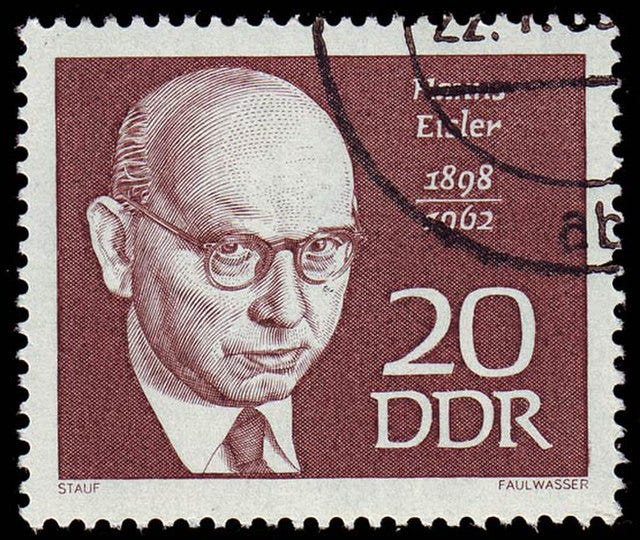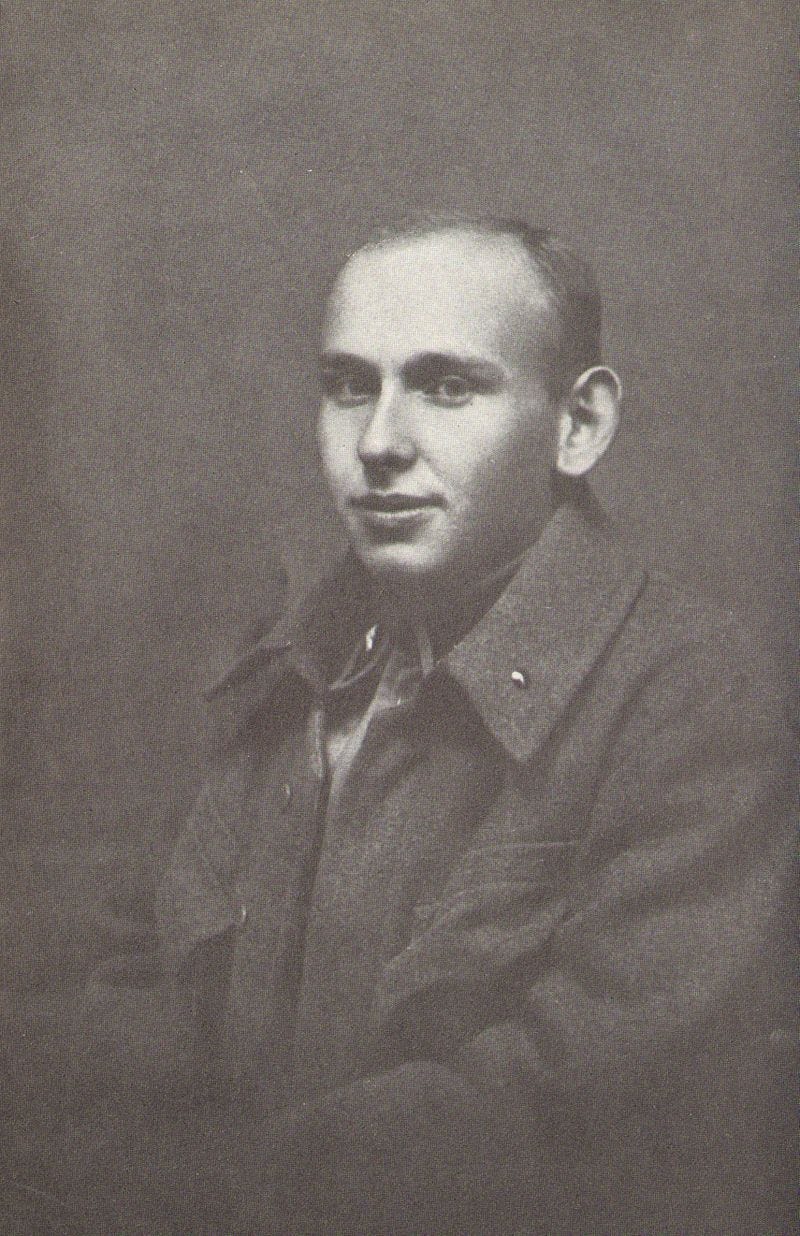Hanns Eisler: Composer, Coward, Communist
Part 1: Isolation and Integration
“Eisler in the jailoe Eisler back at home Ranking scratch his head and cry and I don't know what I'll do Eisler him write music Eisler him teach school Truman him don't play so good and I don't know what I'll do”
Sometime in 1948, Woody Guthrie (1912-1967) penned the lyrics to a song titled “Eisler on the Go”, one of many songs the iconic folk singer rote in response to the political outrages of his moment. Unpublished and unrecorded until well after the singer’s death1 , the lyrics find Guthrie asking himself how he should respond to politically motivated music censorship: what would he do if he too were put on trial over his communist sympathies, as was the case with a growing number of actors, directors, writers, and musicians of the Truman era? What should he, as a politically engaged musician, do about the ongoing persecution of his fellow musicians and artists?
As its name suggests, “Eisler on the Go” was written in reference to Hanns Eisler (1898-1962), a German émigré and composer whose ten year stay in the United States had recently been cut short by growing anti-communist hysteria. The now infamous House Committee on Un-American Activities (commonly known as the HUAC) had spent 1947 subpoenaing, blacklisting, fining, and imprisoning various Hollywood luminaries; Eisler, by then a well-known composer of music for films such as Hangment Also Die! (1943) and The Spanish Main (1945), was no exception. Stars like Charlie Chaplin, Igor Stravinsky, Aaron Copland and Leonard Bernstein came publicly to Eisler’s defense, yet despite their pleas (and his shiny new Oscar nominations), Eisler was eventually deported on March 26th, 1948.
In hindsight, Eisler would seem an easy target for the HUAC: alongside the playwright and dramatist Bertolt Brecht (1898-1956), Eisler had spent the latter years of the inter-war Weimar Republic (1918-1933) encouraging the German working class to overturn the class system by writing didactic songs about workers solidarity and the glories of the Soviet Union. Together, Eisler and Brecht created such pieces of agitprop as the cantata Die Maßnahme (1930), (described by Julian Silverman as “an attempt to explain to new recruits why Party orders have to be obeyed unquestioningly”2) and the “Solidaritätslied”, a successful protest anthem that seems to actually have found admirers on the barricades. Still, the song was far from an organic outgrowth of the “proletarian struggle”: “Solidaritätslied” was written specifically for the film Kuhle Wampe (1932), an early foray into the medium for a composer who would go on to produce the majority of his output for the silver screen. Eisler’s music of the late 20’s and early 30’s was openly, theatrically Marxist, a heady blend of socialist realism and the gritty kaleidoscope of uniforms, marches, speeches, banners, barricades, and pitched battles that was early 30’s Berlin.
The messaging of Eisler’s political songs was not subtle: down with the class system, up with communism, we are the vanguard party of the revolution to come, etc., etc. When it came time for Eisler to “face the music”, however, the members of the HUAC initially found themselves struggling to find a concrete, legally binding link between Eisler’s music and his politics. How were several besuited good old boys to prove that art imitates life, and vice versa? As Lydia Goehr recounts in her essay “Political Music and the Politics of Music”, Eisler’s denial of his involvement in any communist groups, refusal to take responsibility for when and where his music was played, and assertion that the content of his songs amounted to “poetry and not reality”3 were part of a concerted effort by the composer to separate aesthetics from politics (and save his own skin):
“Eisler’s general strategy seemed to be single-minded: he was trying to retreat into the domain of the purely aesthetic, and when he could, the purely musical. ‘My life is wholly devoted to music,’ he was contending. ‘I am not an organizer. I am a composer. … I stick to my music, I don’t know about politics.' Of all people, Eisler seemed to be trying to convince the Committee that being a musician meant that one was necessarily uninvolved in politics. And despite the fact that Eisler had spent his entire life openly committed to the development of a truly political music, the Committee found that they could not easily prove Eisler’s responses untrue, even though they clearly didn’t believe them.”4
Is it possible that Eisler was not, in his heart of hearts, a communist? That he was merely using the aesthetics of communism as a tool of musical expression, a hot new style to gain attention? That what he was after was not revolutionary change in and outside the concert hall, but the subversive edge which the outward trappings of communist politics lent to his art? Regardless of his true beliefs, is it possible that, as Eisler suggests, the abstractions of music have no real bearing on the messiness of actual, everyday politics?
The question of music’s relationship to politics preoccupied Eisler throughout his life. Yet if his arguments at trial were not simply a cowardly and unfruitful attempt to escape persecution, then his implicit assertion that art should have no bearing on reality would mark an enormous change in the middle-aged composer’s thought.
Born in Leipzig in 1898, Eisler grew up in post-war Vienna, learning his trade under the auspices of the disciplinarian, antiquarian, and all-around snob Arnold Schoenberg (1874-1951). Despite his willingness to be radically modern in his approach to harmony and tonality, Schoenberg’s desire to see music “develop autonomously” led him to see music as a separate and escoteric realm unto itself, one with its own history and priorities that had nothing to do with the worldliness of politics. “We, who live in music”, wrote Schoenberg late in his life, “have no place in politics and must regard it as foreign to our being. We are a-political, at best able to aspire to remain silently in the background.”5 Still, it could be argued that the Viennese master ran his studio much like a political party (or, indeed, a religious cult), demanding complete loyalty and obedience from his acolytes. The lines between ethics and aesthetics were so thoroughly blurred in Schoenberg's world that a critique of his patented twelve-tone technique was tantamount to both sin and treason.
While Eisler was not apolitical in Vienna, his devotion to musical craft and the demands of his teacher left little time for any real engagement outside of occasional readings and after-hours discussions with his fellow bohemians. Once in Berlin, he was quickly confronted with the lingering resentment and disappointment felt among the lowest classes of a city that had become a hotbed for both avant-garde art and revolutionary politics.
Berlin had seen more than its fair share of violence during the German Revolution of 1918-19: the crushing of the Spartacist Uprising and the state-sanctioned assassination of the Communist Party of Germany’s (KPD) founders, Rosa Luxemburg (1871-1919) and Karl Liebknecht (1871-1919), had left deep scars, and the years following the Republic’s creation amounted to a further slap in the face of the working class. Never particularly well-off in Vienna, in Berlin Eisler witnessed first-hand the extremes of exploitation, rapid inflation, widespread unemployment, and economic distress which were possible in Germany’s first liberal democracy.
Although the familiar pendulum of capitalism’s booms and busts had begun to swing the other way by Eisler’s arrival in 1925, deep divides still lingered in Berlin, not least of which was the ongoing feud between the more reform-minded social democrats of the SPD (of which the current German chancellor is a member) and the more radical KPD, which continued to fight for a Soviet-style revolution in Europe’s industrial heartland. It was from within this culture of infighting, uncertainty, and division that Eisler began to truly break with his former teacher’s musical isolationism. Having not yet written any openly political work, Eisler nevertheless began to feel that a music which catered only to a small number of educated, wealthy, and sufficiently fashionable members of the bourgeoisie was not only of no use to anyone, but of increasingly dubious artistic merit. As Goehr explains, Eisler’s critiques of music’s bourgeois roots extended further than aesthetics alone:
“Eisler rejected the traditional format of the concert. Performers should no longer merely interpret music; they should be revolutionized. Listeners should no longer sit as passive audiences; they should participate in the performances. Eisler censured the view that music be used like a narcotic, offered to audiences to arouse “effects.” Instead, music should transform the consciousness of an active community of people. The bourgeois musical concert was to be transformed into a political meeting.”6
The task which Eisler set for himself was to overhaul the entire context in which music was performed. In turn, this new context would necessitate new forms, new techniques, and a new set of aesthetic priorities which, without sacrificing craft, would ask: where, when, to what end, and for whom is this music made? Rather than beauty being the highest good, the social nature of music was now to take center stage. For Eisler, the contradiction between music and politics, between art and life, was to be treated, in good Marxist fashion, dialectically. His goal was to politicize the politicizable: music. There was to be no compromise allowed.
— END OF PART 1 —
Billy Bragg and Wilco wrote music for and recorded the song on their 1998 album of unreleased Guthrie lyrics, Mermaid Avenue.
Julian Silverman. “‘Only a Composer’: Reflections on the Eisler Centenary.” Tempo, no. 206 (1998): 24.
Goehr, Lydia. “Political Music and the Politics of Music.” The Journal of Aesthetics and Art Criticism 52, no. 1 ( 1994): 100. These and other subquotes from Goehr are from the transcript of Eisler’s trial prepared by the HUAC, “Hearings regarding Hanns Eisler”.
Ibid.
From a Letter to J. Rufer of 18 December 1947 in Arnold Schoenberg, Briefe, ed. E Stein, Mainz 1958, pp. 262. Sourced from Betz, Albrecht., and Bill Hopkins. Hanns Eisler, Political Musician. Translated by Bill Hopkins. English edition. Cambridge [England] : Cambridge University Press, 1982: 44.
Goehr, 100.






